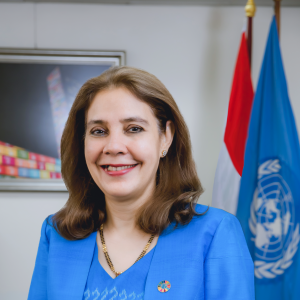HE Pak Febrian Alphyanto Ruddyard, Ambassasdor to UN in Geneva and President of the Trade and Development Board of UNCTAD
HE Amenatave Yauvoli, Ambassador, Republic of Fiji
Ibu Anika Faisal General Secretary, PERBANAS Institute
Pedro Manuel Moreno, Deputy Secretary General, UNCTAD
Selamat Pagi,
I am honored to join you as we take forward the agenda of Indonesia and the region’s green industrial transformation at this high-level dialogue.
As you may know, I am new to this wonderful country and today is a great learning opportunity for me.
Achieving the SDGs will require countries to accelerate their green industrial transformations.
We know this is a complex process as it involves reducing emissions, adopting sustainable practices and implementing circular economies to improve efficiency.
Deep decarbonization of energy by scaling up renewables is foundational to this process. We also know that green industrialization has to be country-led and country-owned so that solutions are tailored to local contexts.
This will require a whole-of-government approach by bringing policy, financing, technology and partnerships to sustain momentum.
This won’t be easy and there are no ready-made solutions.
Indonesia is ambitious about its just energy transition by aiming to boost the share of renewables to 23% by 2025, achieve carbon neutrality by 2050 and net zero by 2060, if not earlier.
Steady progress on renewables will allow for scaling back dependence on fossil fuels, primarily coal.
In this context, UNIDO is working with five industrial parks with more than 700 companies to reduce GHGs, save energy, cut back water use and boost renewables through rooftop solar panels.
In these industrial parks more than 200,000 cubic meters of water, or the equivalent of 50 Olympic-sized swimming pools, is saved annually.
At the same time, 500,000 tons of GHG emissions are being saved in the fertilizer, iron, and steel sectors through the adoption of best available technologies.
What we are learning in Indonesia and other ASEAN nations is that when cost-saving clean technologies are introduced the private sector scales them up on its own in a quick win for bottom lines and the environment.
Similar progress can be made in manufacturing, agriculture, and fisheries by reducing waste and resource use with improvements in product quality to address the export market requirements to the EU throughout supply chains.
Domestic financing will be critical to take this green transition to scale.
This will require broad-based partnerships with government, private sector, and financial markets. On average, nearly $6 billion of annual public expenditure is aligned towards climate action in country.
Simultaneously, the Government, together with UNDP, has leveraged the domestic financial market to mobilize close to $10 billion through green, blue and SDG-related bonds and sukuk.
The issuance of these bonds was subscribed more than two times over, which shows the growing demand for them.
Green sukuk, or Islamic bonds, offer an excellent source of value-based cash inflows into ESG-related investments in alignment with Islamic principles.
Although this type of sharia securities is relatively new, it could benefit from the estimated $3.7 trillion worth of Islamic assets globally. There is a vast untapped market for green-linked Islamic bonds issued by Indonesian entities.
Another entry point for targeted green investments are the UN’s Principles for Responsible Banking.
In Indonesia we are increasingly seeing banks putting in place sustainable financing plans to invest in the country’s low-carbon transition.
UNEP, in its partnership with five banks with an asset base of over $116 billion, is co-creating the development of these financing plans.
As sustainability becomes integral to corporate strategies and investor priorities, the potential for ESG investments will grow.
Indonesia’s forward-looking pathway can serve as a model for emulation within ASEAN and across the wider region.
It is an example of an emerging economy charting its future towards a cleaner and greener society with a low-carbon economy.
Terima Kasih.
---------------
The full speech can also be downloaded, here.






